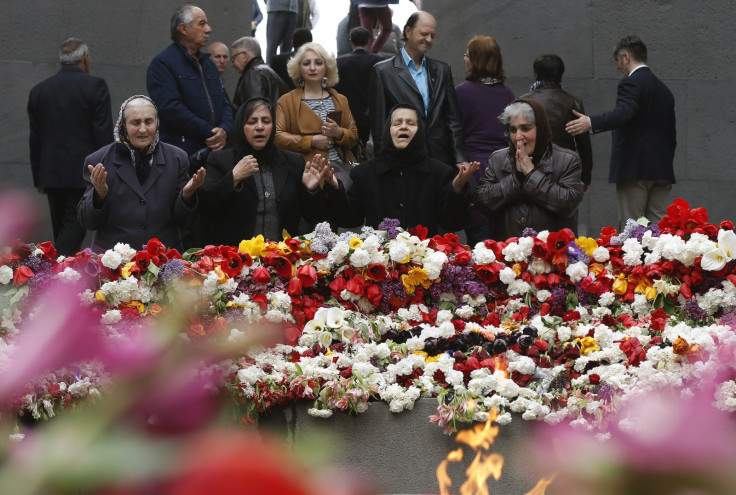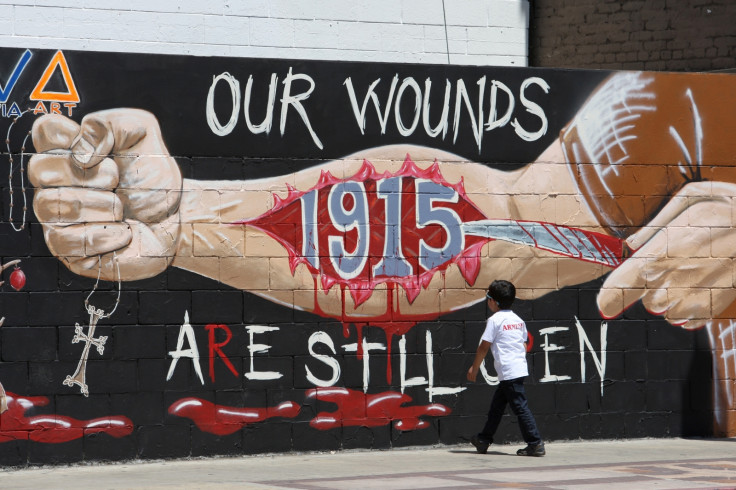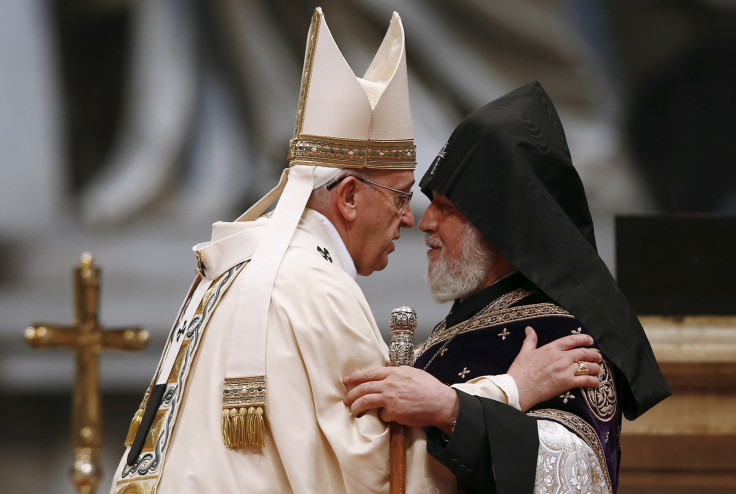Armenian genocide denial: 'The falsification of history keeps the wound bleeding'

There were two million Armenians in the declining Ottoman Empire on the eve of the First World War. By 1922, there were fewer than 400,000. Up to 1.5 million were killed in what historians describe as one of the most flagrant mass violations of human rights in modern history; a massacre that some believe was a contributing factor in allowing Hitler to exterminate the Jews of Europe a quarter of a century later.
The mass killings were carried out in two phases. Able-bodied men were killed through murder and forced labour, followed by the deportation of women, children, the elderly, the sick and the disabled on death marches into the Syrian desert. Rape, torture and other atrocities were common, particularly among girls, and children were forcibly converted to Islam. Around 2,500 Armenian churches and monasteries were burned to the ground, and 2,000 schools destroyed.
Yet Turkey has never accepted the term "genocide". Although the Turkish government recognises killings that occurred in wartime, it maintains they were a regrettable consequence of war – denying ethnic Armenians were systematically targeted, despite opposing views by modern research. So what effect has this had on Armenia, the descendants of the victims and the history of the killings?
Genocide is the final stage of genocide
"Firstly, we have to understand denial is an encapsulating word for Turkey's refusal to take any responsibility, to have any accountability and to offer and humane gesture or acknowledgement of the enormity of the crime," says Peter Balakian, author of The Burning Tigris: The Armenian Genocide And America's Response; and a professor of humanities at Colgate University.
"Scholars of the genocide continually note that denial of genocide is the final stage of genocide," Balakian tells IBTimes UK. "It seeks to demonise the victims and rehabilitate the perpetrators and it sends a message, of course, to the wider world that such human rights crimes demand no accountability. I think this also emboldens future génocidaires ideas."
Turkey's position has indeed softened in the past few years. In 2014, the now-Turkish president Recep Tayyip Erdoğan offered his condolences to Armenia, describing the mass killings as inhumane. But once again, relations have taken a turn for the worse since Turkey's announcement that it would mark the centenary of the Gallipoli landings on 24 April – which critics have called a political manoeuvre to overshadow the 100<sup>th anniversary of the Armenian killings.

"For Armenians, the sense of moral outrage in part stems from absolute absence of acknowledgement, reparations, repair and social justice is one that keeps the wound deep and keeps the sense of moral anger ongoing," Balakian says. "Replace Turkey with Germany and Armenians with Jews and you get another sense of the situation."
Bilateral relations continue to be sour between the two countries. In 1993, Turkey closed its border with Armenia because of the conflict in Nagorno-Karabakh, the site of an unresolved dispute between Azerbaijan, in which it lies, and its ethnic Armenian majority. Although Turkey recognised the state of Armenia shortly after its 1991 independence, after the fall of the Soviet Union, the two countries failed to establish formal diplomatic relations.
Memory
Armenian Turkish citizens have a legal minority status as defined by the Treaty of Lausanne of 1923 for all non-Muslim minority groups and there are around 70,000 living in Turkey. Yet the refusal to recognise the massacre as a genocide is, as argued by some, still discriminatory. Denying genocide is denying memory, educational discourse and public remembrance.
"Memory is so very important," says Raffi Sarkissian, co-chair of the Armenian Genocide Centenary Commemoration Committee. "It is probably the best method to help convey the message about genocide to people who may find it impossible to imagine or comprehend what it actually means, and how it affects generations to follow."
It is probably the best method to help convey the message about genocide to people who may find it impossible to imagine or comprehend what it actually means, and how it affects generations to follow
Other mass killings, such as the systematic murder of six million Jews during the Holocaust, are widely taught in schools.
Education yields critical information into the failures that led to the establishment of the Nazi regime and into human behaviour, essential to preventing history from repeating itself. In Turkey's state-mandated education system, Armenian history is reduced to a few sentences in which Armenians are vilified.
Public debate has also been stifled. In Article 301 of the penal code on "insulting Turkishness", writers who highlight the mass killings of Armenians have been prosecuted, including Nobel laureate Orhan Pamuk.
It is this falsification of history that keeps the wound bleeding, Balakian points out. "The Armenian genocide is the cornerstone of genocide as we understand it in the modern era," he says.
"It is the foundation upon which Raphael Lemkin built his concept of genocide. The refusal of the perpetrators legacy to acknowledge it or deal with it, to show any respect or gesture to the survivor legacy community it deepens the wound. Pope Francis put it well when he described Turkish denial recently as 'covering over evil'."

Repair and restitution
Businesses, farms, schools, hospitals, orphanages, churches and monasteries were all lost or became Turkish state property during Medz Yeghern, an Armenian term that translates as the "Great Catastrophe". A group called Armenian Genocide Losses estimated the total harm caused and benefit gained from the massacre is in excess of $3tn, constituting of reversible harm such as land and property, and irreversible harm including lost lives and destroyed property.
As the demands for repair and reparations increase, are they hindered by Turkey's denial of the massacre?
"Turkey is responsible for around 4,500 destroyed churches, monasteries and schools, and the moveable and immovable wealth of about 2.5 million people and their properties," Balakian says. "That is a conversation that is large and complex, and how reparations there happen remains to be seen, but some of them are in motion irrespective of the Turkish state's stance. It will be interesting to see how they play out."
The Turkish government should understand that whatever it chooses to call the event, their stance to the event does not stand in the way of reparation processes
"The Turkish government should understand that whatever it chooses to call the event, their stance to the event does not stand in the way of reparation processes," Balakian adds. "There are some lawsuits going on in Europe now, for some church properties."
States have increasingly recognised the mass killings as genocide, which has assisted with reparations. In 1997, the International Association of Genocide Scholars passed a resolution unanimously recognising the Ottoman massacres of Armenians as genocide.
As of 2015, the governments of 24 countries, including France, Russia and 43 states of the United States, have recognised the events as genocide. In April, the EU Parliament urged Turkey to recognise the Armenian genocide for "genuine reconciliation" between the two nations but Erdoğan said Ankara would disregard any of the decisions from Brussels.
"Scholarly work done in the last 25 years has been important in a major way because it has been done in archives from all over Europe; all that work has been important to clarifying the moral realities of the event and the restitution urgencies," Balakian says.
"But the demands for various forms of repair and restitution become increasingly urgent and those demands will not go away. Until Turkey can face the human and historical reality of the crime and its aftermath, then those processes can't go forward."
© Copyright IBTimes 2024. All rights reserved.






